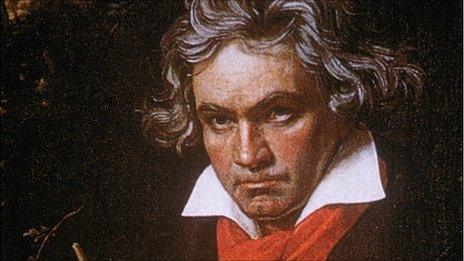Keir Starmer chooses Ode to Joy as music to 'sum up' Labour
- Published
The National Youth Orchestra playing Ode to Joy across Great Britain during the Covid pandemic
Labour leader Sir Keir Starmer has said the piece of music that best "sums up" his party is Beethoven's Ode to Joy.
Speaking to Classic FM, he said the symphony had a "sense of destiny and is hugely optimistic... it's that sense of moving forward to a better place".
The Labour leader's choice has raised eyebrows among some Brexiteers, given it's also the European Anthem.
The lyrics were adapted from a Friedrich Schiller poem celebrating unity and brotherhood - and in its 200-year history, the music has been used by both protest movements and dictators.
It was blasted out by demonstrators at Tiananmen Square, Adolf Hitler had it played for his birthday in 1942, it inspired the character Alex DeLarge to extreme violence in the film Clockwork Orange.
It has been given many different treatments in high and low culture (perhaps, most movingly, by Beaker from the Muppets?)

Keir Starmer (right) is a fan of classical music and learnt the flute as a child
It is also one of the most popular pieces of music picked on BBC Radio 4's Desert Island Discs.
In the 1980s, the EU, then the European Community, adopted it as its national anthem.
Some Conservatives have argued the choice of music signals Sir Keir's pro-EU leanings.
The Labour leader was on the Remain side in the Brexit referendum, but since the party's bruising defeat in the 2019 general election, he has generally been reluctant to talk about the EU.
Conservative chairman Richard Holden was critical: "What piece of classic music is Sir Keir Starmer's favourite - choose any in the world. A Wesleyan Hymn… some rousing Elgar… a modern American classic… a slice of Wagnerian Opera… and he alights on the EU anthem.
"Simultaneously totally naff and completely telling."
Conservative peer Lord Frost said "one must suspect Starmer of making a pro-EU political point".
A source close to the Labour leader said: "It is well documented Keir Starmer has always listened to a lot of Beethoven - his choice has nothing to do with his opinions on the EU."
Explaining his choice during the interview, Sir Keir said the music reminded him of being in his twenties, but also the fall of the Berlin Wall in 1989.
Deputy Speaker Lindsay Hoyle tells off SNP MPs whistling Ode to Joy
"I was out of university. I'd just got my feet under the desk as a lawyer, had my whole life ahead of me."
"And the Berlin Wall came down. This was an incredible feeling of freedom, of change in my life. Things were going to be fundamentally different."
He said Ode to Joy became the "lead song" connected with the wall coming down and he associated the music with "a brighter future".
On why it reflects Labour he said: "You've got the orchestra, you've got the voices, you've got this big combination. This is very sort of Labour."
He is not the first political leader to express his love for Ode to Joy.
During the Brexit referendum, Boris Johnson hit back at suggestions he was "a little Englander" by attempting a few lines of the song in German.
Boris Johnson sings in German
Ex-Labour adviser, and a director at Public First consultants, Tom Hamilton says there is a tendency to read too much into these choices.
"In the end it is the politician choosing their favourite piece of music... it is not done by committee."
He worked for Ed Miliband when the then-Labour leader appeared on Desert Island Discs.
He didn't have any input into the choices, but says if he had he would've advised his boss not to pick Robbie Williams' Angels as his favourite song. "But that is just because I don't like it."
It is, he says, "slightly ludicrous" to jump to the conclusion that the song choice reveals the Labour leader's continuing Remainer allegiances.
He adds that Sir Keir would have been able to predict the criticism he would receive for picking the song - and that is evidence that "he just likes it".
However, those determined to read hidden meaning into the Labour leader's choice can hear his interview on Classic FM on Sunday.
And while it is Ode to Joy that has received all the attention, Sir Keir's other choice was Beethoven's 5th piano concerto, the Emperor Concerto.
Perhaps that is the pick which gives us the real insight into Sir Keir's political ambitions.
Related topics
- Published22 September 2023

- Published8 August 2013

- Published23 May 2024

- Published22 September 2016
